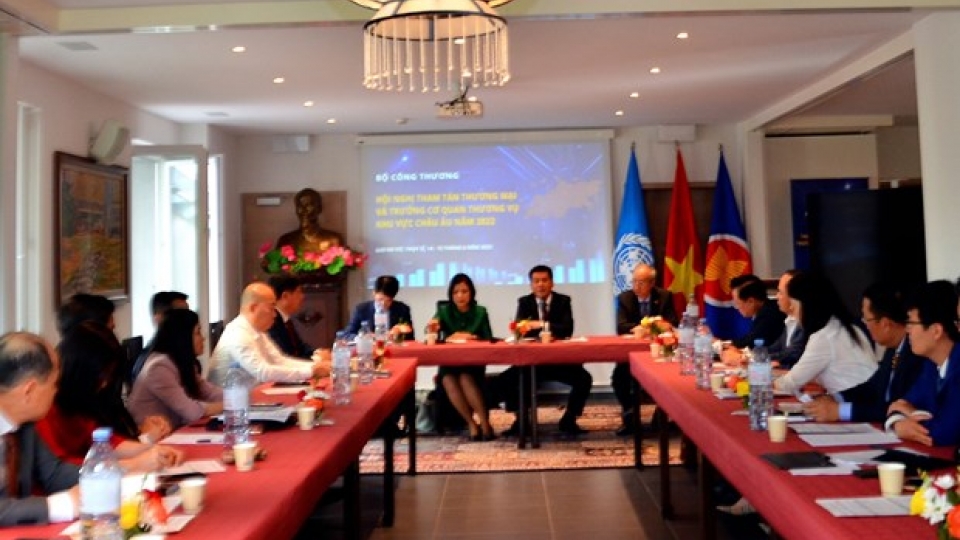Vietnam’s trade counsellors believe in opportunities amid tariff challenges
Representatives of Vietnam's trade offices abroad have highlighted opportunities and give recommendations for Vietnamese businesses to navigate tariff-related challenges and promote exports.
Speaking at a hybrid conference held by the Vietnam Trade Promotion Agency under the Ministry of Industry and Trade on April 28, Do Ngoc Hung, Trade Counsellor and head of the Vietnam Trade Office in the US, noted that trade relations between Vietnam and the US are facing tariff-related challenges. However, amid these challenges lie opportunities, as leading US retailers such as Walmart, Target, Costco, and HomeDepot remain optimistic, expressing their support and confidence that Vietnam will reach an agreement with the US through the removal of reciprocal tariffs.
Many leading businesses and distributors of the US are planning to attend the Vietnam International Sourcing Expo 2025, slated for this September, he noted, revealing that many positive signals have been recorded in tariff negotiations between the two countries.
Hung recommended that Vietnam enhance strategic cooperation with the US to ensure the sustainable development of bilateral relations, in areas from industry to trade, investment, energy, and artificial intelligence. He also stressed the need to diversify export markets through free trade agreements (FTAs), particularly new-generation FTAs, and stimulate domestic demand.
Additionally, he urged businesses to improve their competitiveness in the domestic market. It is necessary to enhance the competitiveness of key support industries, upgrade technology, promote innovation, simplify business regulations, and improve infrastructure to reduce production costs and boost product quality.
Particularly, the business community should strengthen resilience and diversify supply chains to reduce dependence on a single market for raw materials and intermediate goods. Boosting exports with higher intellectual content and domestically generated value will help enhance the economy’s ability to withstand external shocks.
Regarding trade defence, Hung warned that as countries facing high tariffs could adopt stronger protectionist measures, the competition pressure on the Vietnamese market may increase. Therefore, full cooperation with US authorities in providing information during trade investigations is crucial to safeguard businesses’ interests and mitigate legal risks.
In early May, Vietnam’s Minister of Finance is set to lead a large business delegation to attend the "Select USA Investment Summit" in the US. The Vietnamese delegation is expected to be one of the largest among participating nations, underlining the country’s commitment to fostering sustainable and effective bilateral economic cooperation, Hung revealed.
Meanwhile, Tran Thu Quynh, Trade Counsellor in Canada, highlighted that opportunities for Vietnamese products in the Canadian market remain strong, with exports to this market continuing to grow steadily. Canadian statistics showed that Vietnam’s exports have so far not been significantly affected by the global tariff war, and key high-value export items are maintaining positive growth. It is expected that Vietnam’s total export turnover to Canada in 2025 can match 2024’s figures and be kept at US$10 billion as targeted.
This is a prime time for manufacturers, retail chains, and trade intermediaries from both countries to not only shift supply chains but also relocate production, investment, technology, and branding activities, while developing new logistics and transportation platforms and building the CPTPP ecosystem, she noted.
She recommended greater inter-agency cooperation to provide businesses and associations with practical and well-founded information for their long-term strategic decisions. The Vietnam Trade Office in Canada is working to remove trade barriers, including lobbying for a bilateral agreement to simplify the rules of origin for textiles and garments, and to open this market for Vietnam's processed meat and dairy products.
Regarding Vietnam’s exports to Australia, Nguyen Thu Huong from the Vietnam Trade Office in Australia reported that Vietnam’s shipments there rose 13.2% in the first three months of 2025, reaching nearly US$1.6 billion, with many sectors experiencing strong growth.
Vietnam enjoys numerous advantages in exporting to Australia thanks to a robust bilateral relationship and preferential tariffs under the FTAs of which both countries are members, such as the Comprehensive and Progressive Agreement for Trans-Pacific Partnership (CPTPP), the ASEAN-Australia-New Zealand Free Trade Area (AANZFTA), and the Regional Comprehensive Economic Partnership (RCEP). Moreover, the large Vietnamese and Asian communities in Australia provide a favourable consumer base.
However, due to global trade tensions, Australia’s domestic purchasing power has weakened, prices have risen, and the Australian dollar has depreciated to its lowest level in five years. Vietnamese goods will face stiff competition from products from China, Thailand, and other countries. Additionally, if Australia lowers tariffs on US goods, Vietnamese agricultural exports could face increased competition from US products.
At the conference, representatives from Vietnam’s trade offices abroad noted that although US tariff policies have triggered global market volatility, challenges always come with opportunities. Therefore, businesses must enhance their production capabilities to sustain exports to existing markets and intensify efforts to access new markets.
Trade offices will continue to monitor market trends, consumer behaviours, and new policies of other countries to assist businesses in meeting new standards and accessing potential markets, they noted.




